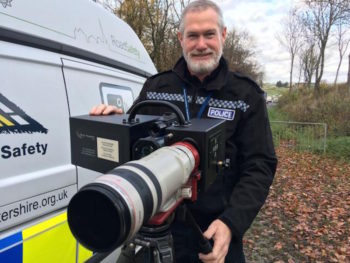Drivers back use of long-range speed cameras
The majority of drivers support the use of long-range speed cameras, new research from the RAC finds.

In less than a month of being deployed, the long-range camera has recorded more than 1,000 speeding offences with the worst offender clocked at 126mph
The research comes on the back of Gloucestershire Constabulary’s trials of a camera that can catch drivers speeding, using mobile phones or not wearing seatbelts from up to 1km away. Dubbed ‘The long eye of the law’, the camera had recorded more than 1,000 speeding offences less than a month after it was deployed, with the worst offender clocked at 126mph.
The RAC research, carried out among 2,201 members of the RAC Opinion Panel, found that six in 10 drivers (59%) are in favour of such cameras. Only 28% were against the camera being used by all UK forces, with 13% not expressing an opinion. Women were supportive of their use than men (69% v 50%). Older female drivers over the age of 65 were the most supportive, with 83% of those surveyed saying they should be introduced everywhere.
Seven in 10 (71%) felt a long-range camera would make the country’s roads safer while half (50%) believed it would lead to more drivers being caught speeding as many manage to spot traditional, single-location fixed cameras – or even normal mobile cameras – in advance and slow down.
On the issue of whether speed cameras should be visible, drivers surveyed by the RAC were split with 45% saying it is fair to have hidden police speed traps without warnings and 46% saying it was not. In addition, respondents gave very clear support for mobile speed cameras and police radars with only a quarter (25%) claiming they should be scrapped and 75% saying they should continue to be used.
The research also revealed there was no appetite for further increasing the penalties for speeding from the current minimum standard fine of £100 and three penalty points, with the majority (69%) believing this should be kept the same. Fifteen per cent argued that it should be raised and 16% said it should be reduced.
RAC road safety spokesperson Pete Williams said that the long-range cameras will primarily be used to catch speeding drivers but could have other benefits. He commented: “While there is certainly no question that speeding needs to be controlled as reported road casualty statistics show exceeding the limit was a contributory factor in 14% of fatal accidents in 2017 some drivers would prefer this new camera to be used to enforce other motoring offences.
“The new camera may bring some road safety benefits in relation to speeding that existing camera technology doesn’t. Fixed, single location cameras at accident blackspots are effective road safety tools and average speed cameras are good at controlling speeds over longer stretches, but as both are visible deterrents it could be argued they don’t have as powerful a long-term effect on drivers’ behaviour as the fear of being caught by a long-range speed camera on a motorway or straight country road would.
He added: “With dramatically fewer roads police officers on patrol these days enforcement of multiple motoring offences via long-range camera could be seen as a more efficient use of police time, and something that is clearly very much welcomed by drivers who don’t break the law in these ways.”












